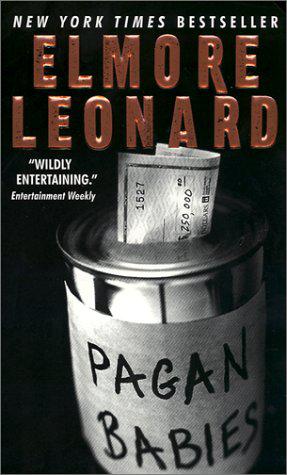The Barnes & Noble Review
September 2000
Elmore Leonard Does It Again! Without a doubt, Elmore Leonard is not only one of the most accomplished authors around, he's inarguably the coolest. Dubbed "the greatest crime author of our time, perhaps ever!" by the notoriously hard-to-please New York Times, Leonard follows the phenomenal success of Be Cool with his 36th novel, Pagan Babies. And it emerges as Leonard's funniest straight-faced novel to date with its most devilish, irresistible hero.
Leonard at His Best
Some years ago, Elmore Leonard offered an interviewer a memorably succinct description of his distinctive technique, stating, "I just try to leave all the boring parts out." During the course of a career that has spanned nearly 50 years and has produced more than three dozen books, he has held to this aesthetic principle with remarkable consistency. Anyone wanting to see how he does it should check out Leonard's latest. It's called Pagan Babies, and it's a textbook example of how to write fiction that is spare, fresh, funny, and absolutely boredom-free.
Pagan Babies opens in present-day Rwanda, a nation still haunted by the genocidal tribal conflicts of the mid-1990s, conflicts that resulted in the wholesale slaughter of some 800,000 Tutsi natives. At the center of the narrative is "Father" Terry Dunn, an American missionary who may or may not be a legitimately ordained Catholic priest and who is himself haunted by the memories of atrocities committed within his church. Terry's tenure in Rwanda comes toanabrupt end when he hears the confession of an unrepentant murderer and exacts an extreme and lethal form of penance. Immediately afterward, he leaves Africa and returns for the first time in more than five years to his home in Detroit and to the various complications some new, some old that are waiting for him there.
To begin with, Terry who has had a checkered, distinctly nonpriestly career must finally face a five-year-old indictment for cigarette smuggling and tax fraud. With the help of his brother Fran, a successful personal injuries lawyer, he cons the local district attorney a devout Catholic into dismissing all charges. In the process, Terry meets and falls in love with a former legal investigator named Debbie Dewey, whose own career is at least as colorful as Terry's.
When we first encounter her, Debbie is working as a stand-up comic in an entry-level Detroit comedy club. She is hungry even desperate for success and recognition, having just served a three-year prison term for aggravated assault. Debbie's assault conviction which forms the basis for one of her more colorful comic monologues was the result of a spontaneous attempt to run down the lowlife former boyfriend who lied his way into her life, then cleaned out her savings account before moving on to his next victim. When, shortly after her release, Debbie discovers that this larcenous ex-boyfriend (Randy Agley) is now a wealthy and successful restaurateur, she devises a scheme to divest Randy of a large portion of his newly acquired money. At this point, she enlists the assistance of her newfound friend and lover, Terry Dunn.
Initially, the scheme involves a staged "slip and fall" designed to net an out-of-court settlement of $250,000, to be divided equally between Debbie and Terry, who is acting on behalf of the orphaned children of Rwanda. However, since Pagan Babies is an Elmore Leonard novel, nothing goes off exactly as planned. Complications inevitably arise as a large cast of secondary characters interpose themselves between Debbie, Terry, and their projected payoff. Included among them are a number of figures from Terry's days as a part-time cigarette smuggler, an aging Mafia don with medical and legal problems, and a dimwitted hit man named Searcy J. Bragg, a.k.a. Mutt.
Pagan Babies is pure, high-grade Elmore Leonard, a first-rate entertainment that is alternately horrifying and hilarious, touching and grotesque. Leonard's cool, laid-back narrative voice, his pitch-perfect ear for dialogue, and his characteristic ability to populate his stories with a varied and convincing assortment of characters are on full display throughout, from the opening sequences in war-torn Rwanda to the surprisingly moving conclusion. Like the best of Leonard's earlier fiction Glitz, Get Shorty, Freaky Deaky, City Primeval Pagan Babies is hip, smart, and artfully composed, the unmistakable product of a modern master of the form.
Bill Sheehan
Bill Sheehan reviews horror, suspense, and science fiction for Cemetery Dance, The New York Review of Science Fiction, and other publications. His book-length critical study of the fiction ofPeter Straub, At the Foot of the Story Tree, has just been published by Subterranean Press (www.subterraneanpress.com).


دیدگاه کاربران